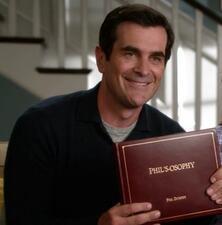 Father,
Father,  Phil Dunphy,
Phil Dunphy,  father's heart
father's heart  Tuesday, October 15, 2013 at 11:17AM
Tuesday, October 15, 2013 at 11:17AM  It’s an established fact: parents do not live in reality.
It’s an established fact: parents do not live in reality.
When I was a 4-foot, 11-inch freshman in high school (you heard me), my Dad regularly told me I was a tough guy—tough enough to beat up “anyone in the school.” I knew what he was up to. He wanted me to believe in myself. He wanted me to approach life from a posture of confidence, yet he obviously didn’t live in my world. He had good intentions, but no wisdom to help me through high school.
This is true of all parents. When my oldest daughter went through high school she had a highly calibrated sense of social judgment and hierarchy. She knew from day to day who was “in” and who was "out." Check that—she knew it from hour to hour. This time I was the father: “Honey, who cares what other people think? You are smart, funny, warm, and beautiful.” Right, Dad.
I was disconnected from her world. I didn’t know the score, and what’s more, I was powerless to change the score. All the areas that matter to a teenage girl were beyond what little influence or power I possessed. What’s more, I suspect she would have been embarrassed if I really did know and understand her world. It belonged to her, not me.
The two lessons we learn growing up? Our loved ones may not have the wisdom or the power to help us. We are utterly on our own. Sometimes the best advice from our loved ones cannot provide the wisdom and strength we need to face our challenges. Experience teaches us that even if we trust our parent’s heart and motives toward us, they do not have the wisdom to guide us, or the power to act on our behalf. We love them and they love us, but it is not enough.
This is precisely the heart of the problem: first-hand we see our parent’s limitations, which means our experience also teaches us not to trust the Heavenly Father. One of the deepest transitions following our born-again experience is the need to grow up again—this time with the perfect parent. Paul wasn’t kidding when he said:
So from now on we regard no one from a worldly point of view. Though we once regarded Christ in this way, we do so no longer. Therefore, if anyone is in Christ, the new creation has come: The old has gone, the new is here! (2 Corin 5:16-17)
When he urged us not to regard anyone from a worldly point of view, it’s important to include the Heavenly Father in that mix. We enter a new world, with a new Father, and the defenses we built up to protect us from our earthly parents can actually hold us back from the love and yes, power, that flows from the New Father. In God’s kingdom, the Father displays perfect love (motivation), perfect wisdom (insight), and perfect power (strength to help us) toward his children.
After we come to terms with the idea that the One who knows us best loves us most we have a second transformation: total surrender to the Perfect Father. We have so many years of disappointment; too many memories of our loved ones letting us down. Life experience has caused us to turn inward. We take care not to let our hearts fall too deeply in love. We live by the whispered caution, “Take care: no one understands!”
The good news is better than you could have ever hoped for. We have Father poised toward us with perfect love, wisdom, and power. In the Kingdom of God there is a new, established fact: our New Father see things the way they really are. We can trust him.
 Father,
Father,  Phil Dunphy,
Phil Dunphy,  father's heart
father's heart  Wednesday, August 15, 2012 at 10:58PM
Wednesday, August 15, 2012 at 10:58PM  I know a guy who grew up in the kind of Christian home where going to the movies was considered sinful. The lure of forbidden fruit was strong: he longed to go to the movies and see exactly what was so wicked. The only thing that kept him from sneaking away to the theater was the nagging fear: what would happen to him if Jesus came back at the exact hour he was inside a movie theater?
I know a guy who grew up in the kind of Christian home where going to the movies was considered sinful. The lure of forbidden fruit was strong: he longed to go to the movies and see exactly what was so wicked. The only thing that kept him from sneaking away to the theater was the nagging fear: what would happen to him if Jesus came back at the exact hour he was inside a movie theater?
I know another guy who was determined to never say “never” to God, because he was sure that God would enforce upon him the one thing he never wanted to do! I suggested that he tell the Almighty that he would never serve God in Hawaii, but my friend was not amused.
We carry conflicting ideas about God’s heart. With our heads we boldly believe that God is willing to pay any price for the redemption of mankind but with our hearts we cannot believe that God loves us personally. True, God “so loved the world” that he sent his Son to save us all, but loving the world doesn’t mean that God loves me.
Our theology allows for the love of God. Do our hearts allow it?
The answer does not come easily. Our hearts--each one of us--resist the idea that anyone could love us unconditionally. Married couples can remain together for years and still find themselves driven by the fear of rejection even though their spouse has demonstrated love time and again. Even in healthy, balanced families children have no real grasp of their parent’s love until they themselves become parents. Our insecurities run like subterranean rivers, watering our fears from below even when our surface life is filled with love and acceptance.
Jesus knew human nature all too well. He understood the pressures to perform for acceptance, and the fears of rejection. In one amazing passage he both acknowledges our shortcomings as human beings and uses our very faults to assure us of God’s love--God’s personal, one-on-one love for each of us: "Which of you, if his son asks for bread, will give him a stone? Or if he asks for a fish, will give him a snake? If you, then, though you are evil, know how to give good gifts to your children, how much more will your Father in heaven give good gifts to those who ask him!" (Matthew 7:9-11)
In this passage I see and feel the genius of our Lord. Jesus saw the imperfect love of fathers and mothers. It’s something we all have seen. We see mothers who lose patience and fathers who are preoccupied. We watch at grocery stores as parents speak sharp words when children don’t deserve a rebuke. If we are parents ourselves, we know firsthand how often the well of devotion runs dry and we have little or nothing left to give. Yet we also know that even in our weakness we would never substitute stones for bread or snakes for fish. We may not always be up to the task of love, but we will not harm our children. Jesus used our failings to encourage us that a perfect Father can love completely.
Somehow we are tempted to change the equation when it comes to God. We do not see his perfection as a perfection of heart, but only a perfection of holiness. We may address him as “Father” but we have no real certainty the word means the same thing when we are talking about God.
Jesus came not only to save: he came to demonstrate the possibilities of a life-giving relationship with the Father. Religious authorities were scandalized by his intimacy with the Holy God of Abraham. Who would dare call the Creator of the universe “Papa”? The mind-blowing answer is not simply that Jesus would dare to do such a thing, but that he invites us to do the same.
The Apostle Paul understood the bold invitation presented by Jesus. In the soaring beauty of Romans, chapter eight, Paul challenges us to considers the possibilities of a life-giving relationship with Papa. Not simply forgiveness of sin, but daily, joyful interaction with a Father who delights to be with us: "For you did not receive a spirit that makes you a slave again to fear, but you received the Spirit of sonship. And by him we cry, 'Abba, Father.' The Spirit himself testifies with our spirit that we are God's children." (Romans 8:15-16) Not God’s children in some legal sense. Not children in some metaphor. We are really children, and really his. Toward the end of the chapter Paul reminds us that Jesus was the “firstborn” specifically for the reason that God wanted many more children. No servants, but sons and daughters.
We can read these words, think these thoughts, and still jump to the next web page unaffected. It takes the presence of God’s Holy Spirit to break through. The Holy Spirit is with you right now, where you sit and read.
What’s your hurry? Take moment, take a breath, and pray a prayer:
Spirit of God, will you come here--right now--and bring the heart-knowledge that my Father loves me?